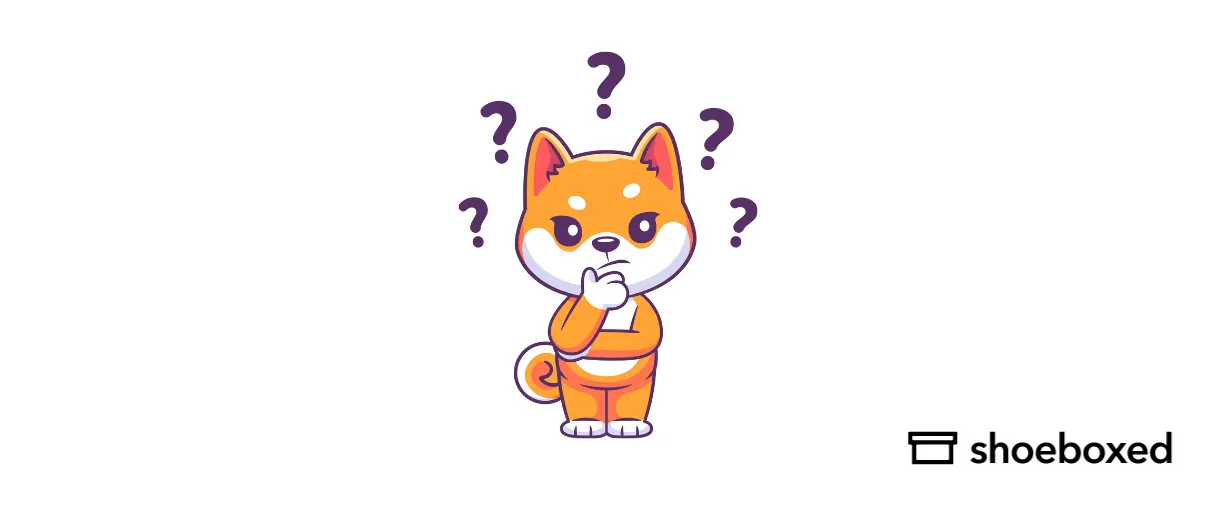Bookkeepers and accountants, although they may overlap, are two crucial and different roles in your business. Knowing the difference will help you make informed decisions about your financial management.
The key to any business is to keep detailed and up to date financial records and reports of all business transactions so the business owner can make sound business decisions at any time based on the cash flow statement. Hiring a bookkeeper to file and document the business's financial records is essential for maintaining accurate and organized data.
If a bookkeeper keeps records of all business transactions and an accountant interprets and analyzes that data, between a bookkeeper and an accountant, which one does your small business need or do you need both?
What does a bookkeeper do vs accountant?
A bookkeeper and an accountant have two different roles. A bookkeeper keeps the financial records of business transactions on a daily basis. This includes records of payments, sales, receipts and purchases. Bookkeepers basically track all the money that comes in and out of the business. A bookkeeper provides financial data for the accounting process.
While a bookkeeper records financial transactions, posts debits and credits, generates invoices, manages payroll, and maintains and balances ledgers and accounts, an accountant comes in to verify and interpret that data. Their roles, although different, are highly collaborative to ensure your financial information is accurate and reliable.
The accountant takes the bookkeeper’s information and takes it a few steps further by analyzing the data, adjusting entries, generating forecasts, looking for business trends, preparing financial statements & tax returns, performing audits and generating reports.
With all that information in financial statements and reports, an accountant can give business owners advice. This advice includes where your business stands financially, what that means, what to do about it and where to go from here.
What’s the difference between a staff accountant and a bookkeeper?
An accountant can be a bookkeeper but a bookkeeper isn’t an accountant without the right education and certification. The biggest difference is the education and certification.
Bookkeepers don’t need an education in finance or certification. However, they can get licensed if they want to add a professional touch to their business.
On the other hand, staff accountants typically have a bachelor’s degree in finance or accounting. To become CPAs (certified public accountants) they must meet their state’s requirements and pass the CPA exam which includes standard accounting principles and tax laws.
CPAs are more specialized in tax codes and can represent clients before the Internal Revenue Service in case of an audit. CPAs must meet ongoing educational requirements to maintain their accreditation.
Other credentials accountants can get such as CFA and CIA allow them to offer specific services to businesses. CFAs or chartered financial analysts are knowledgeable about global markets, investment analysis, ethical financial practices and portfolio management.
A CIA or certified internal auditor is an accountant who is certified to conduct internal audits. CIAs specialize in the accounting process that involves security monitoring and financial risk assessment.
Aspect |
Bookkeeper |
Accountant |
|---|---|---|
Primary Role |
Recording daily financial transactions |
Analyzing financial data and providing strategic insights |
Key Responsibilities |
- Record sales and purchases |
- Prepare financial statements |
|
- Manage accounts payable and receivable |
- Conduct audits |
|
- Reconcile bank statements |
-Tax preparation and planning |
|
- Maintain general ledger |
- Financial forecasting |
|
- Prepare basic financial reports |
- Budgeting and strategic planning |
Educational Requirement |
Typically requires a high school diploma or associate degree and certification in bookkeeping |
Requires a bachelor's degree in accounting or related field and often a CPA (Certified Public Accountant) license |
Level of Detail |
Focuses on the details of daily transactions |
Focuses on the big picture and long-term financial health |
Scope of Work |
Transactional and operational |
Analytical and strategic |
Compliance |
Ensures accurate recording of transactions |
Ensures compliance with financial regulations and standards |
Interaction with Data |
Primarily inputs and organizes financial data |
Interprets and analyzes financial data to provide insights |
Reporting |
Prepares basic financial reports (income statements, balance sheets) |
Prepares detailed financial statements and regulatory filings |
Decision Making |
Provides data for decision making |
Advises on financial decisions and business strategies |
What's a valuable tool for both bookkeepers and accountants?
Automation and expense management benefits both the bookkeeper and accountant.
Shoeboxed
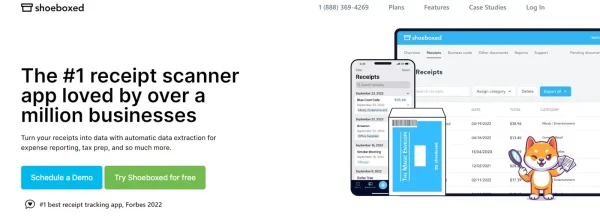
Shoeboxed is a valuable tool for both bookkeepers and accountants, enhancing their efficiency and accuracy in managing financial records and other documents.
Here, we’ve broken down the benefits for each.
Shoeboxed for Bookkeepers:
Bookkeepers can simplify their bookkeeping by using an app or outsourcing their receipt and document management.
Digitizes and Automates financial transactions data entry
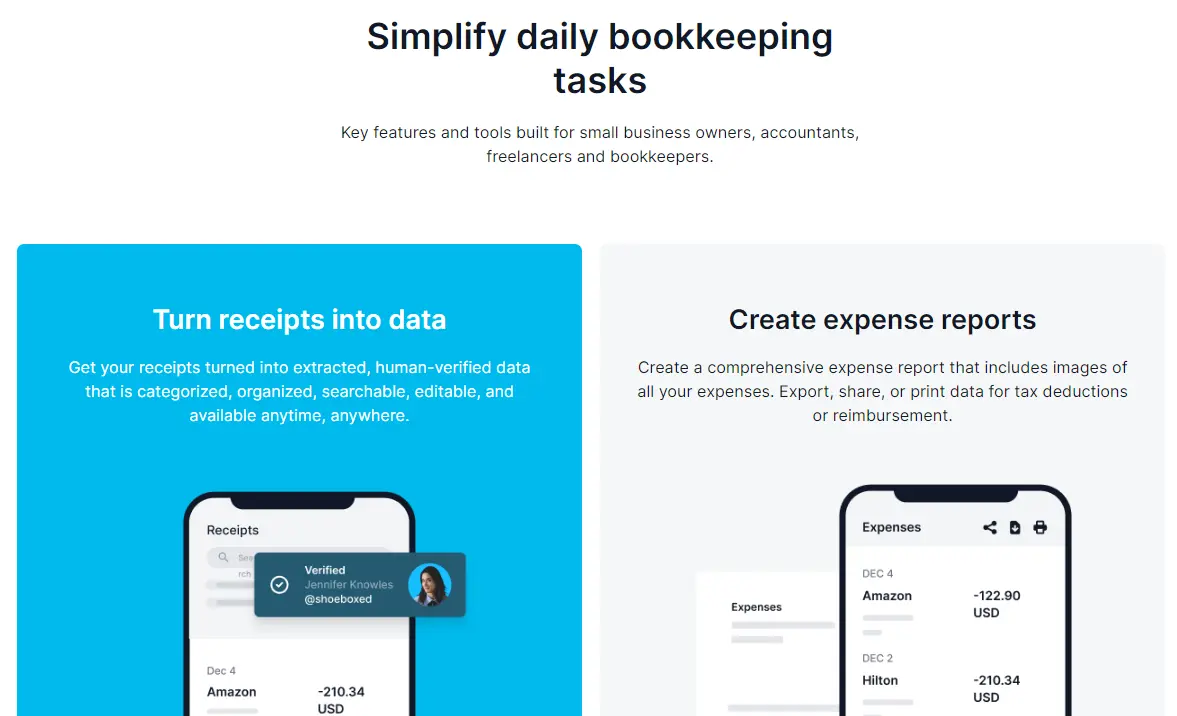
Bookkeepers handle many receipts and documents from a financial perspective. So many, that often they're hard to keep up with and organized.
Digitizing the paper format reduces paper clutter and manual entry and makes the data much more accessible.
Mobile app
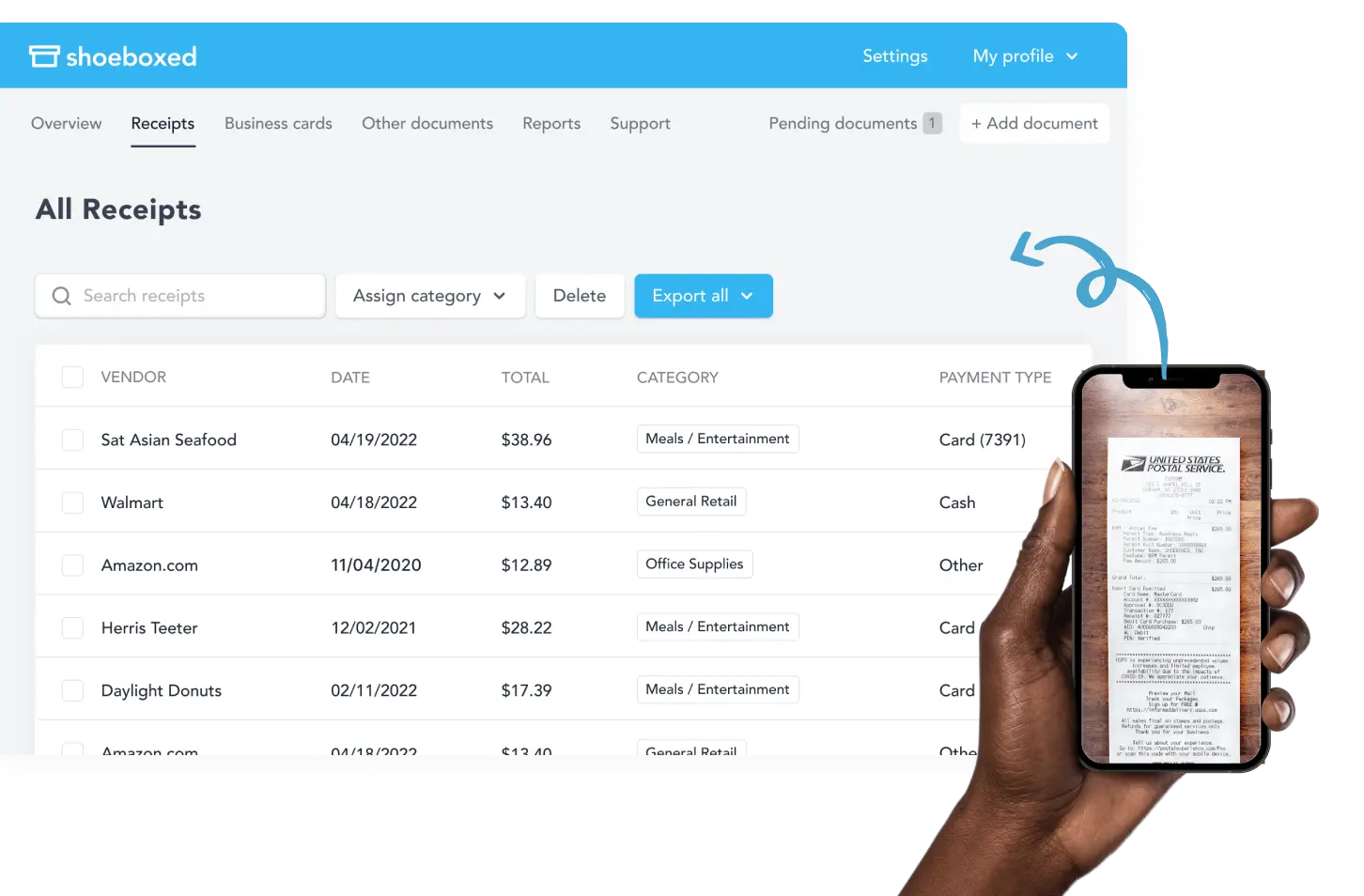
With Shoeboxed, bookkeepers can use the camera on their mobile device and Shoeboxed's app to scan, digitize, and upload receipts and documents into a designated Shoeboxed account.
Magic Envelope Service
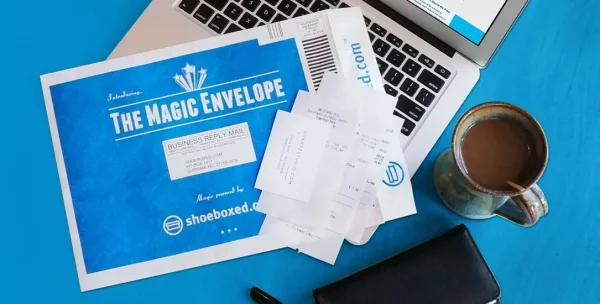
Or, if bookkeepers don't have time for scanning, they can outsource this task to Shoeboxed. Shoeboxed provides a free postage-paid Magic Envelope that can be filled with batches of receipts and mailed to Shoeboxed's processing center to be scanned, human-verified, and uploaded into their account.
Shoeboxed is the only receipt scanner app that will handle both your paper receipts and your digital receipts—saving customers up to 9.2 hours per week from manual data entry!
Expense tracking
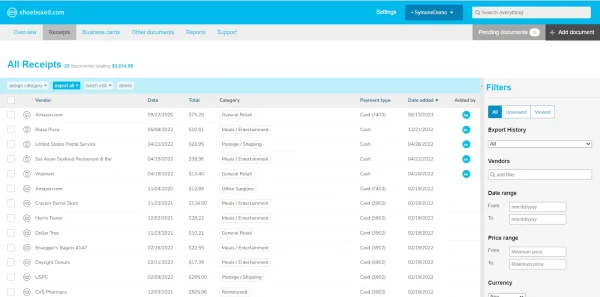
Bookkeepers can use Shoeboxed to categorize expenses automatically, ensuring that all transactions are accurately recorded.
Once uploaded, Shoeboxed categorizes and organizes the scanned items into tax or customized categories.
This auto-categorization saves bookkeepers time and reduces errors.
Stop doing manual data entry 🛑
Outsource receipt scanning to Shoeboxed’s scanning service and free up your time for good. Try free for 30 days!✨
Get Started TodayReceipt management
Shoeboxed provides a centralized storage solution for all receipts, making it easy for bookkeepers to organize and retrieve documents as needed.
Integration with accounting software
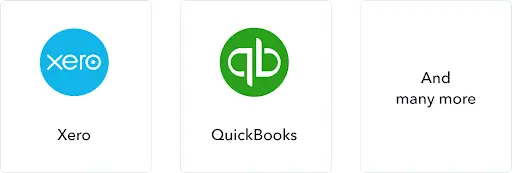
Shoeboxed integrates seamlessly with popular accounting software like QuickBooks and Xero, allowing bookkeepers to sync data effortlessly and keep financial records up-to-date.
Shoeboxed for Accountants:
Shoeboxed is just as beneficial to accountants.
Accurate financial data
By leveraging Shoeboxed, accountants receive accurate and organized financial data from bookkeepers, which simplifies the analysis and reporting process.
Tax compliance
Shoeboxed helps ensure that all receipts are stored in a format accepted by the IRS, aiding in accurate tax preparation and compliance.
Turn receipts into data for tax time ✨
Try Shoeboxed’s systematic award-winning approach to receipt tracking for tax season. Try free for 30 days!
Get Started TodayFinancial reporting
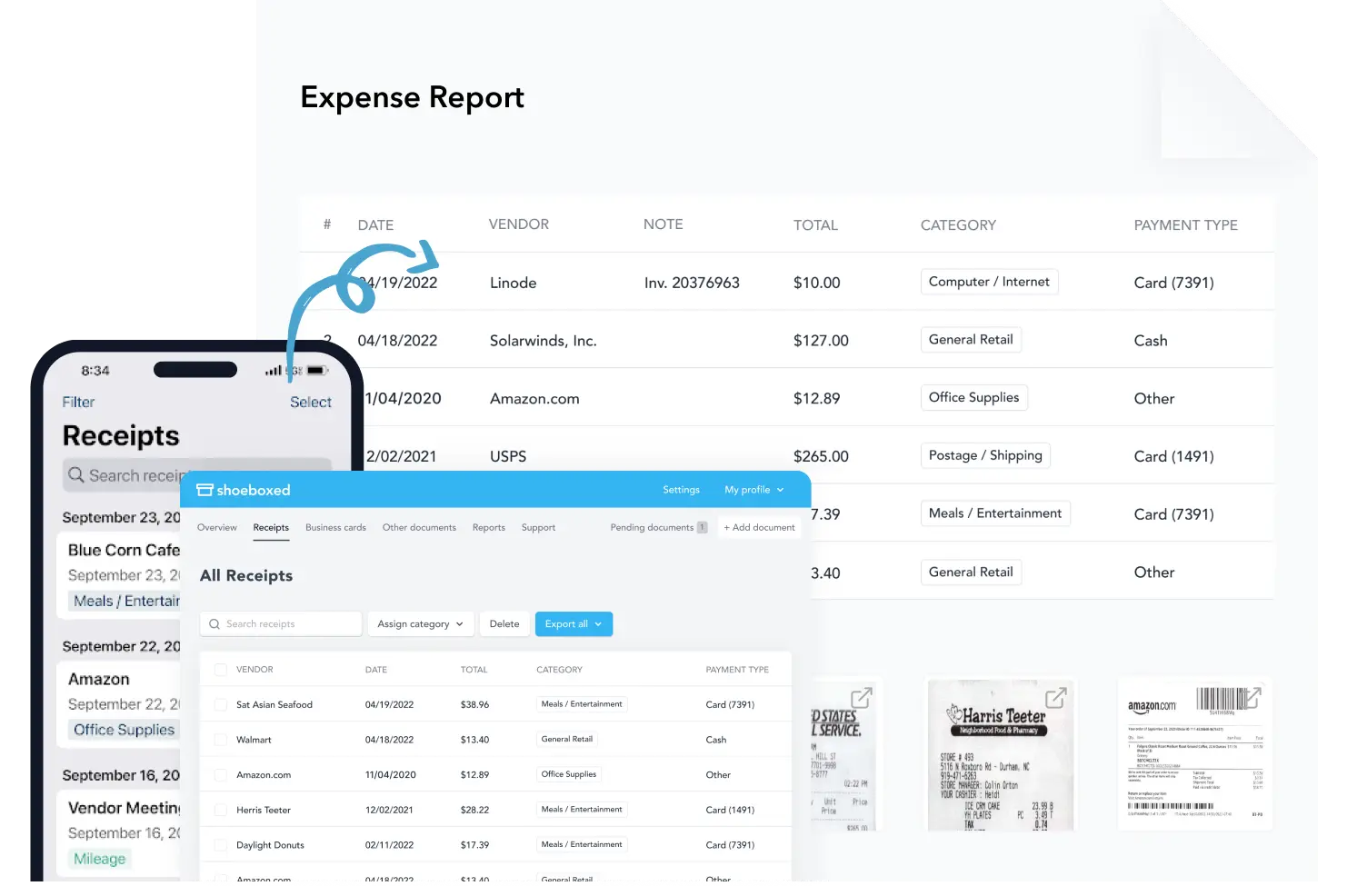
Accountants can use the categorized and organized data from Shoeboxed to prepare detailed financial reports and conduct in-depth financial analysis.
Audit trail
Shoeboxed provides a clear audit trail, which is essential for accountants when conducting audits and ensuring regulatory compliance.
How much does a bookkeeper charge vs an accountant?
The rate an accountant or bookkeeper charges depends on many factors. These include how much work needs to be done, the level of expertise required, the state where the work is being performed and whether the fee will be a fixed price for a specific service or an hourly rate.
According to the U.S. Bureau of Labor Statistics, in 2023, the national average hourly rate for bookkeepers was $22.81 per hour and for accountants $38.41 per hour. Accountants make more because of their educational background and certified public accountant (CPA) certification.
How much is a bookkeeper’s vs an accountant’s salary?
Like what bookkeepers and accountants charge an hour, their salaries are also based on many factors. Salaries are based on education, certification, years of experience, credentials, industry or employer, job description, location and complexity of work.
According to the U.S. Bureau of Labor Statistics for 2023, the national average salary for bookkeepers was $47,440 and for accountants $79,880. Again education and certification plays a role in the different salary amounts.
When to hire an accountant vs bookkeeper
Whether to hire an accountant versus outsourced bookkeeping services depends on your business needs. Professional bookkeepers will document daily transactions, track your business’s financial records and financial information and keep everything organized.
Those detailed records may save you money if you hire an accountant later. Bookkeepers charge lower fees for their services than accountants. So it’s not a bad idea to hire a bookkeeper first to get those services at minimum and then hire an accountant later to do the taxes. Using an employee cost calculator can also help you manage expenses effectively.
However, there are also advantages of hiring a certified accounting professional over a bookkeeper. Accountants offer financial analysis, higher expertise and legal assistance. Accountants can give recommendations and strategies so that you are making the most out of your business. They can advise on investing and taxes. Accountants can also help businesses deal with corporate taxes and legal issues.
Frequently asked questions
How much does a bookkeeper and an accountant charge per hour?
According to the U.S. Bureau of Labor Statistics, in 2023, the national average hourly rate for bookkeepers was $22.81 and for accountants $38.41.
How much is a bookkeeper’s vs an accountant’s salary?
According to the U.S. Bureau of Labor Statistics, the national average salary for bookkeepers was $47,440 in 2023 and for accountants $79,880.
What does a bookkeeper do vs an accountant?
Bookkeepers focus on tasks that include documenting daily transactions, recording financial transactions and generating financial reports. Accountants focus on tax filing, tax strategies and advising on a business’s finances, business structure, economic forecasts etc.
In conclusion
It can be tough for small business owners to decide if and when to hire a bookkeeper or an accountant. If you’re spending so much time on the financial end of your business that you can’t meet all your customers’ needs, you can’t focus on other areas of your business, you don’t know how to use accounting software or don’t have time to grow your business, then it’s time to ask for help from one or both.
You can start with a bookkeeper to do all the books and financial reporting and then hire a CPA later to do your taxes during tax season. Both are huge benefits as your business grows and your finances get more time-consuming and complicated.
Caryl Ramsey has years of experience assisting in different aspects of bookkeeping, taxes, and customer service. She uses a variety of accounting software for setting up client information, reconciling accounts, coding expenses, running financial reports, and preparing tax returns. She is also experienced in setting up corporations with the State Corporation Commission and the IRS.
About Shoeboxed!
Shoeboxed is a receipt scanning service with receipt management software that supports multiple methods for receipt capture: send, scan, upload, forward, and more!
You can stuff your receipts into one of our Magic Envelopes (prepaid postage within the US). Use our receipt tracker + receipt scanner app (iPhone, iPad and Android) to snap a picture while on the go. Auto-import receipts from Gmail. Or forward a receipt to your designated Shoeboxed email address.
Turn your receipts into data and deductibles with our expense reports that include IRS-accepted receipt images.
Join over 1 million businesses scanning & organizing receipts, creating expense reports and more—with Shoeboxed.
Try Shoeboxed today!



